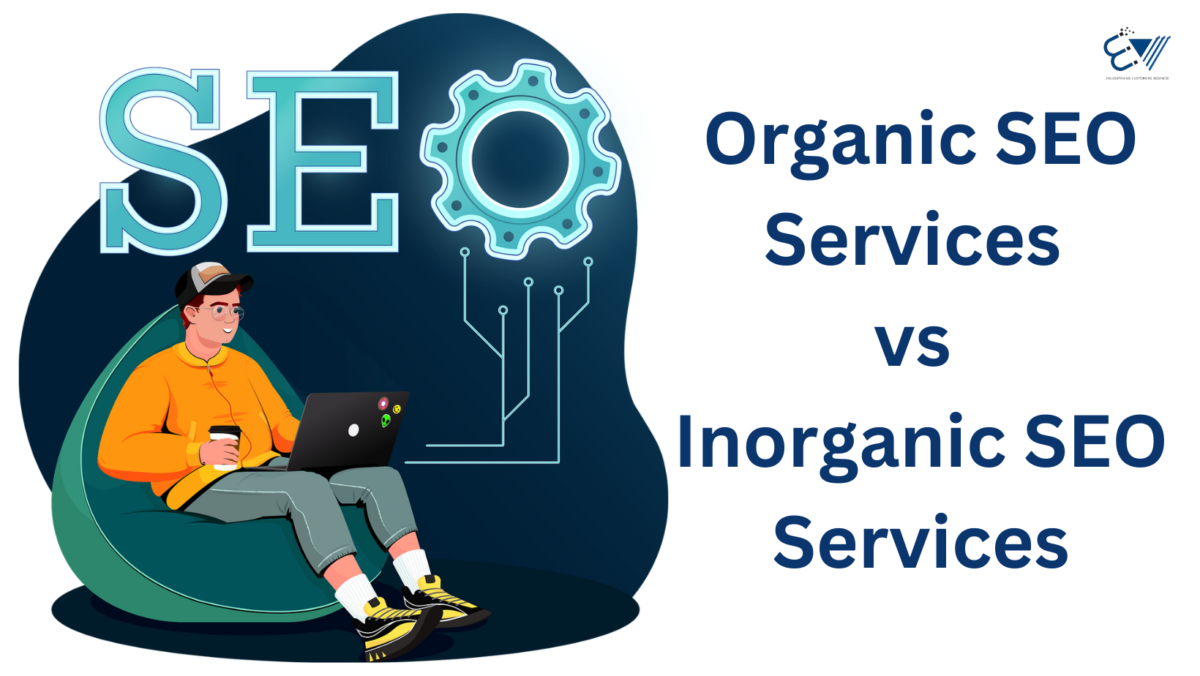In the rapidly evolving digital landscape, businesses strive to enhance their online presence and attract more traffic to their websites. This pursuit often leads to the adoption of SEO services. Understanding the differences between organic SEO services and inorganic SEO services is crucial for businesses aiming to maximize their digital marketing efforts. In this article, we will delve into the key aspects of both approaches, comparing their benefits, drawbacks, and best use cases to help you make informed decisions.
What are Organic SEO Services?
Organic SEO services involve strategies aimed at improving a website’s visibility in search engine results through unpaid methods. These techniques focus on enhancing the site’s relevance and authority, which in turn helps it rank higher on search engine results pages (SERPs).
Key Components of Organic SEO Services
- Keyword Research and Optimization
- Identifying relevant keywords and integrating them naturally into your content.
- Ensuring that these keywords align with the search intent of your target audience.
- Content Creation and Marketing
- Producing high-quality, engaging, and informative content that addresses the needs and queries of your audience.
- Using blog posts, articles, infographics, and videos to provide value to your visitors.
- On-Page SEO
- Optimizing meta tags, headers, URL structures, and internal links.
- Enhancing the readability and user experience of your website.
- Technical SEO
- Improving site speed, mobile responsiveness, and secure browsing (HTTPS).
- Ensuring proper indexing by search engines through the use of XML sitemaps and robots.txt files.
- Link Building
- Acquiring high-quality backlinks from authoritative websites to boost your site’s credibility and authority.
Benefits of Organic SEO Services
- Cost-Effective: Once implemented, organic SEO can drive continuous traffic without ongoing ad spend.
- Sustainable Results: Organic SEO builds a strong foundation for long-term visibility and growth.
- Enhanced Credibility: Websites that rank organically are often perceived as more trustworthy and reliable by users.
- Better User Experience: Emphasis on high-quality content and site optimization leads to improved user engagement and satisfaction.
What are Inorganic SEO Services?
Inorganic SEO services, also known as paid search marketing or PPC (Pay-Per-Click) advertising, involve paying for ad placements on search engines. These ads appear at the top of the SERPs, above the organic listings.
Key Components of Inorganic SEO Services
- Keyword Bidding
- Competing in auctions to secure ad placements for high-value keywords.
- Managing bids to maximize the return on investment (ROI).
- Ad Creation
- Crafting compelling ad copy and designing visually appealing ads.
- Using various ad formats such as text ads, display ads, and shopping ads.
- Landing Page Optimization
- Creating and optimizing landing pages to ensure a seamless user experience.
- Enhancing the conversion rate by aligning the landing page content with the ad’s promise.
- Campaign Management
- Setting budgets, monitoring performance, and making adjustments to improve effectiveness.
- Using tools like Google Ads and Bing Ads for campaign management.
- Performance Tracking
- Analyzing metrics such as click-through rates (CTR), conversion rates, and cost per acquisition (CPA).
- Continuously refining campaigns based on data insights.
Benefits of Inorganic SEO Services
- Immediate Results: Paid ads can generate traffic and visibility as soon as the campaign goes live.
- Targeted Reach: Allows precise targeting based on keywords, demographics, location, and user behavior.
- Scalability: Easily scale campaigns up or down based on performance and budget.
- Measurable ROI: Detailed analytics provide clear insights into the effectiveness of your campaigns.
Comparing Organic SEO Services and Inorganic SEO Services
Cost and Budget Allocation
- Organic SEO Services: Require an upfront investment in content creation, optimization, and technical improvements. Over time, the costs decrease as the organic rankings improve and sustain themselves.
- Inorganic SEO Services: Involve continuous expenditure on ad placements and keyword bidding. The costs can be high, especially for competitive keywords, but the immediate results can justify the expense.
Time to Results
- Organic SEO Services: Typically take longer to show significant results. The process involves gradual improvements in rankings as search engines index and rank the optimized content.
- Inorganic SEO Services: Deliver instant visibility and traffic. Ads start appearing in search results as soon as the campaign is activated, making it suitable for time-sensitive promotions.
Longevity and Sustainability
- Organic SEO Services: Offer long-lasting benefits. Once a website achieves high rankings, it can maintain visibility with minimal ongoing effort, provided the site continues to offer quality content and user experience.
- Inorganic SEO Services: Results are short-lived and tied directly to the ad spend. When the budget is exhausted or the campaign ends, the visibility and traffic cease immediately.
User Trust and Perception
- Organic SEO Services: Users often trust organic search results more than paid ads, viewing them as more credible and authoritative.
- Inorganic SEO Services: While effective in driving traffic, paid ads are clearly marked as advertisements, which may affect user trust and perception.
Control and Flexibility
- Organic SEO Services: Offer less immediate control over rankings and visibility. Changes in search engine algorithms can also impact rankings unpredictably.
- Inorganic SEO Services: Provide precise control over ad placements, budget, and targeting. Marketers can quickly adjust campaigns based on real-time performance data.
Integrating Organic and Inorganic SEO Services
For a comprehensive and effective SEO strategy, businesses often benefit from combining both organic and inorganic SEO services. This integrated approach leverages the strengths of each method to maximize overall visibility and performance.
Short-Term and Long-Term Goals
- Short-Term: Use inorganic SEO services to gain immediate visibility, drive traffic, and capture quick wins. This is particularly useful for new product launches, seasonal promotions, and competitive markets.
- Long-Term: Invest in organic SEO services to build a strong foundation for sustained growth and lasting visibility. Focus on creating high-quality content and optimizing your site to maintain top rankings over time.
Data-Driven Insights
- Leverage PPC Data: Use insights from your PPC campaigns to inform your organic SEO strategy. Identify high-converting keywords and integrate them into your organic content.
- Optimize Ad Spend: Allocate budget based on the performance of both organic and inorganic efforts. Adjust spending to maximize ROI and overall effectiveness.
Conclusion
Choosing between organic SEO services and inorganic SEO services depends on your business goals, budget, and timeline. At Edifying Voyages, we recommend a balanced approach that combines the strengths of both strategies to achieve optimal results. By leveraging the immediate impact of paid advertising and the long-term benefits of organic SEO, you can create a robust and effective digital marketing strategy that drives traffic, enhances visibility, and fosters sustainable growth.





